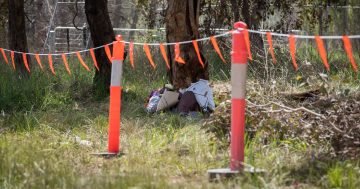
Attorney-General Shane Rattenbury thinks laws will change as a result of the new council, which is expected to start its work later this year. Photo: Thomas Lucraft.
The function of a body to ensure the Territory’s criminal and sentencing legislation keeps in line with community expectations has been revealed, nine months after it was first announced.
The Law Reform and Sentencing Advisory Council (LRSAC) was announced in October last year among loud calls for a review of the ACT’s entire judicial system.
It’s something both Attorney-General Shane Rattenbury and the ACT Bar Association rejected at the time, with the advisory council pushed as an alternative that would be more substantive than a “one-off review”.
According to the terms of reference, the council will provide the Territory’s Attorney-General with “high-level, independent advice”, making sure it also gives proper consideration to human rights and/or any obligations under the Human Rights Act 2004.
“The Council will prepare advice for the ACT Government on areas of potential law reform and provide expert advice on sentencing matters,” Mr Rattenbury said.
“An important function of the Council will be to help bring together perspectives from across the community, to inform and advise on law reform and sentencing issues.”
The council will undertake community and stakeholder consultation, and conduct and publish research, all of which would be recommended to the government to assist with making systemic improvements and changes to areas the community thinks need work.
“There have been calls from within the community for law reform and changes to sentencing,” Mr Rattenbury said.
“This Council will operate independently, to address issues as they arise in a considered and consultative fashion.”
In delivering its law reform function, it is expected the council will review and research various areas of law and legal policy with the aim to modernise, eliminate defects, and simplify and consolidate legislation. It would also identify any laws that could be repealed due to them becoming obsolete or unnecessary, and check for uniformity with the laws of other jurisdictions and the Commonwealth.
Under its sentencing advisory role, the council could provide advice on sentencing-related matters, research and analyse sentencing matters, consult with and educate the community, as well as make recommendations for sentencing reforms.
There will be 13 people on the council, with expressions of interest open for a retired judicial officer, senior law academic expert, victims of crime advocate, and two community representatives – including at least one Aboriginal and/or Torres Strait Islander person – to bring their experiences to the body.
Expressions of interest close on 31 July.
LRSAC membership could also include representatives from ACT Policing, ACT Courts, the ACT Bar Association, the ACT Law Society, the Human Rights Commission and the legal assistance sector.
The Attorney-General can also appoint members to the council “from time to time”, according to the terms of reference.
The Canberra Liberals are supportive of setting up the LRSAC, but have called the proposed make-up of council members “lop-sided” and lacking community voices.
“There is a clear overrepresentation of government officials, legal professionals and academics allocated places on the Council and minimal input from genuine community sources will be possible with only two Council spaces for community members out of a total thirteen spaces,” Shadow Attorney-General Peter Cain said.
“It is also disappointing that there is just a two-week application period, a particular disadvantage for members of the community wishing to apply.”
The delay in establishment could be down to a failed procurement process back in May, during which time the terms of reference were still being finalised.
This procurement process wasn’t for council members, but for support to the secretariat and others on the council.
It had been hoped this support would be provided by a university, however this wasn’t successful.
“To facilitate the Council being established as quickly as possible, support for the Council will now be delivered through an interim secretariat located within the Justice and Community Safety Directorate (JACS),” a government spokesperson said.
“Secretariat staff will be ACT Public Servants, reporting directly to the Council on substantive matters related to the work of the Council.”
It’s proposed this interim approach will be in place for at least 12 months.
The government is aiming to have the council commence its work sometime later this year.





















